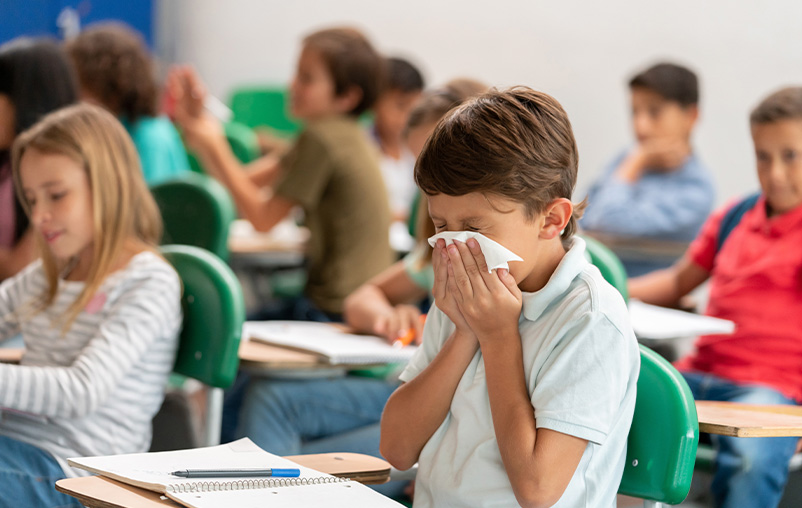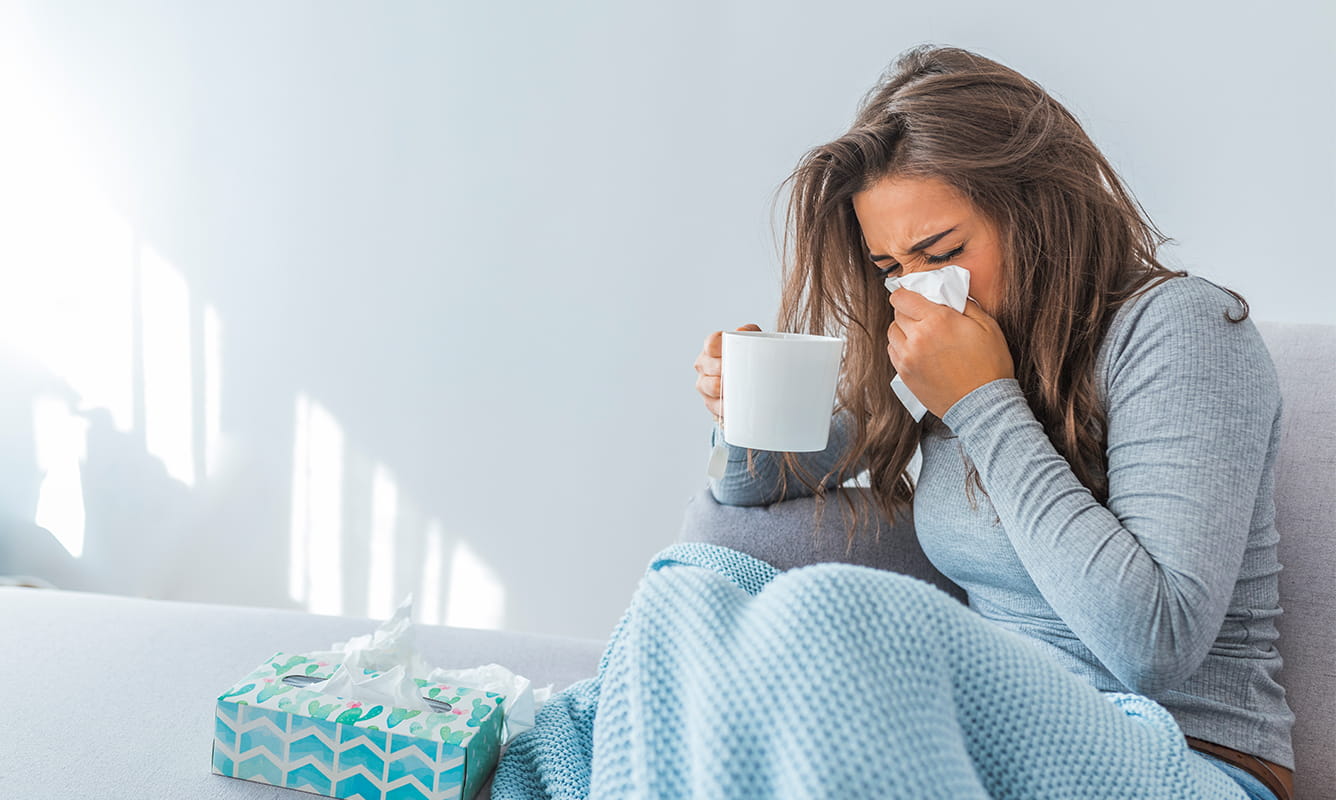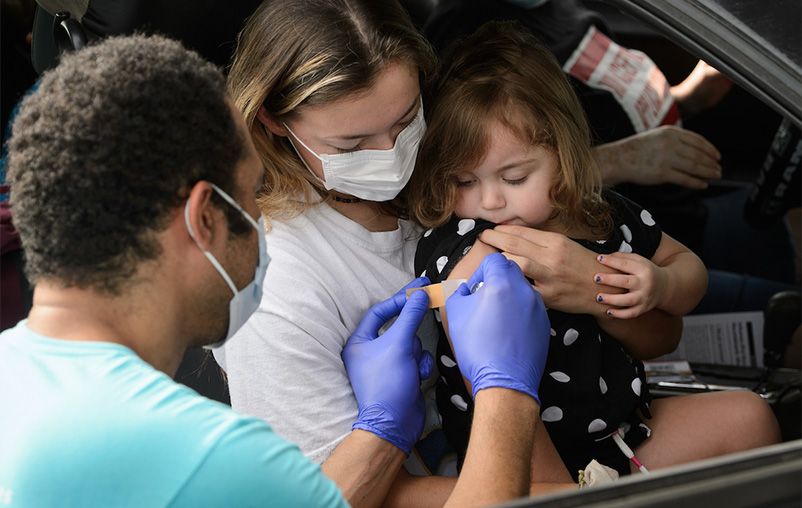We’ve learned a lot since the COVID-19 pandemic began, and been through new variants like delta and omicron. But many important prevention methods, like masks, are the same.
Dr. Jason Bowling shares what’s new and what still holds true on protecting yourself and others.
How are masks an important part of controlling the spread of COVID-19?
We know that masks are a very important tool to help prevent the transmission of COVID-19, in addition to hand hygiene and physical distancing. When we look at states that have higher mask compliance and mandates for wearing masks, they tend to have lower cases of COVID-19.
Also, we’ve seen that when people have been exposed to somebody else with COVID-19, if they’ve been wearing a mask, they oftentimes are protected from getting infected themselves.
Masks have demonstrated themselves consistently to be a very important tool in preventing infection.
Can you give us a quick review of mask etiquette?
Masks have to be worn regularly. It’s really important that when you’re going out, in addition to remembering your phone and your keys, remember to bring your mask. It’s easy to forget because these are relatively new things we have to take when we go out somewhere, but taking your mask is important.
Wearing your mask as intended is also really important. It has to cover both the nose and the mouth. Oftentimes you see people wearing their mask underneath their nose, and that’s a no-no.
The respiratory droplets can be spread both from the wearer if your nose isn’t covered, but you’re also exposed and those droplets can reach the mucous membranes of your nose and increase your risk for infection. So if you’re not covering your nose and your mouth, you’re still at risk.
It’s also important to not touch the front of the mask because you can contaminate it. It’s a good idea to put it on and take it off by using the loops or taking it off from the back and doing hand hygiene before and after you take it on and off.
Well-fitting masks work better than loose-fitting masks in general, both to protect yourself from droplets coming in and to reduce the amount of droplets that might come out.
What is an N95 versus a KN95?
An N95 is a name that’s given to a respirator, which is a special type of mask that provides more filtration than other non-respirator type of masks. So they’re generally referred to as respirators, but it’s a mask you wear. It’s been tested to see how much it can reduce as far as filtration through the mask. In the health care setting we generally have fit testing to make sure people get a good seal with those.
KN95s are more equivalent to surgical or barrier masks, so they’re similar in name but they have more filtration similar to barrier masks. They don’t have quite the same level of rigor and filtration as the N95 respirators.
KN95s look kind of like a hybrid between the N95 mask and a barrier mask. They have ear loops similar to a lot of the barrier or medical procedure masks. They have N95 in the name, but they are more similar to a barrier mask or surgical mask on that spectrum. An N95 respirator is really the most filtration you can get out of a respirator.
How can I be sure I’m not getting a fake mask?
The best way to make sure you’re not getting a fake mask is to get it from a reputable vendor. If you’re buying it online you may want to cross check it or verify it with the CDC, go to a credible source they have a list of masks there to tell you what to look for to make sure the mask that you’re buying is what you’re expecting.
Should I wear an N95 to go about my daily business?
The N95 respirator is the top notch respirator as far as blocking virus and other particles you’ll breathe in. It has the most filtration. It’s important that if you’re wearing one of those you wear it appropriately.
A barrier mask is the next level down. It’s important that those have a nose wire, that they fit snugly around your face. They don’t provide as much filtration as the N95.
So the question comes up, should I always wear an N95? The biggest issue with the N95 versus the barrier mask is comfort. We see that people have a lot of difficulty being able to keep that N95 on, and I think one of the key tenets of wearing a mask is that you have to wear it, right.
The mask only works if you wear it appropriately. They don’t work as a chin strap, they don’t work if your nose is showing, they don’t work if they’re loose-fitting. So if you’re having difficulty keeping an N95 on consistently, then you’re not going to get that protection. Also, if you’re not wearing it appropriately, if you don’t watch the videos and educate yourself on how to get an appropriate seal, you may not be getting the same level of protection that you think you’re getting by wearing that over a barrier mask.
The CDC recommends you wear the mask that’s comfortable for you so you can wear it consistently. Because really the most important thing while you’re in the grocery store is that you keep that mask on the whole time. If you have an N95 on and it fits well and you can wear it the whole time, that’s great, but if you have to take it down halfway through your grocery trip, then it isn’t providing the protection that a barrier mask would if you wore it consistently.
Do surgical masks work?
The surgical masks have been around for a long time, everybody’s familiar with those. Obviously they were invented for surgeons to wear during operations to protect the patient from the surgeon’s mouth, but they also protect the wearer from respiratory droplets coming in as well. They’re used in the health care environment and are very important there.
They protect against the large respiratory droplets that COVID-19 patients produce when they cough, so they’re a very helpful tool in the health care environment. They’re also worn outside the health care environment.
Do cloth masks still work to prevent the spread of omicron?
Cloth masks still work. They don’t provide the same level of protection that you’d get with a barrier or medical procedure mask or an N95 respirator, which is the top level of protection you can get. If you wear a cloth mask, and they’re more readily available, there are some important things you need to know about them. They need to have at least two layers of fabric if not more. You need to make sure they fit appropriately, that they fit snugly over your nose and mouth.
They need to be cleaned regularly — that’s a big issue. You need to wash them at least once a day, or if they’re soiled or look dirty. And they need to be dried after they’re cleaned so you can make sure you kill any bacteria that might be on that cloth mask.
So you can still wear cloth masks, and we don’t want people to get scared away from those in case that’s the only mask they have available to them. But it’s important to know that you have to wear it appropriately. It doesn’t provide the same level of protection that you’re going to have with a barrier or surgical mask or the higher level N95 respirators.
Do masks with valves work?
The issue with masks with valves, and those are predominantly seen on N95 respirators that have a valve, is that it allows the wearer to breathe out and air to escape. It protects the wearer from incoming droplets, but it’s not as good at preventing droplets from the wearer going out to other people. So if they had COVID-19 infection, they might still be able to transmit out through that valve. So it’s not as good as an N95 alone for protecting other people outside of the wearer if the wearer were infected.




